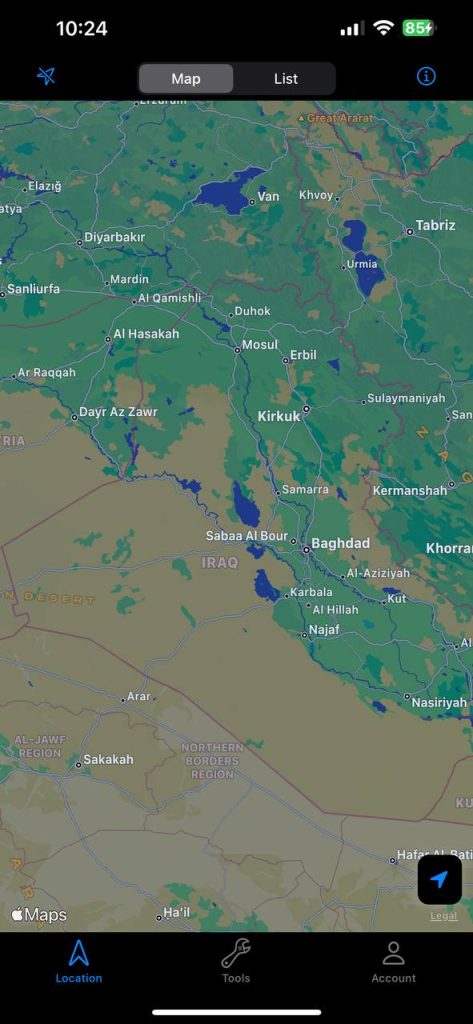Location Simulation IPA (LocSim No License) For iOS
The amazing LocationSimulation (LocSim) IPA app is the perfect companion for devices compatible with TrollStore on All iOS. Without the need for jailbreaking or a computer, this app allows users to instantly change their iPhone location directly on the device. This app also includes seven additional useful tools. Installing it on TrollStore will add an icon to your Home Screen, which provides quick and easy access to the app. Once open, the app will be divided into 3 sections: Location Simulation, Useful Tools, and Mine, where users can buy a license.

Importance of Location Simulation in Mobile App Development
In today’s mobile-centric world, location-based services have become an integral part of many applications. Whether it’s a navigation app, a weather forecast app, or a food delivery app, accurate location information is vital for delivering relevant and personalized experiences to users. However, testing these apps in different geographical locations can be challenging, especially for developers who don’t have the means to physically travel to those places. This is where location simulation comes into play.
Location simulation allows developers to virtually transport their devices to any desired location, enabling them to test how their applications behave under various circumstances. By emulating different GPS coordinates, movement patterns, and environmental conditions, developers can ensure that their apps function correctly and provide accurate information, regardless of where the users are located. Moreover, location simulation helps identify potential bugs or performance issues that may arise due to different network conditions, such as low signal strength or poor connectivity.
Benefits of Using Location Simulation Tools
Using location simulation tools in mobile app development offers several benefits. Firstly, it saves time and effort by eliminating the need for physical travel to different locations. Developers can easily switch between multiple locations within seconds, allowing them to test their apps under various scenarios efficiently. This not only speeds up the development process but also enables developers to iterate and fine-tune their applications more quickly.
How to Download And Install LocSim for videos IPA on iPhone iPad without computer?
How to Install LocSim for videos IPA with Sideloadly?
Overview of Location Simulation IPA and LocSim
Location Simulation IPA and LocSim are two popular tools used by iOS developers for location simulation. Location Simulation IPA is an iOS app that can be installed on a device to simulate different locations. It provides a user-friendly interface where developers can enter specific GPS coordinates, adjust movement speed, and even simulate changes in altitude. Location Simulation IPA also allows for importing and exporting location profiles, making it easy to share and reuse specific simulation settings.
On the other hand, LocSim IPA is a location simulation tool provided by Apple as part of the Xcode development environment. It offers a comprehensive set of features for simulating various location scenarios. With LocSim, developers can simulate movement patterns, test location-based notifications, and even simulate changes in network conditions. It seamlessly integrates with the Xcode simulator, making it an excellent choice for iOS app development.
How to Use Location Simulation IPA for iOS App Development
Using Location Simulation MOD IPA for iOS app development is straightforward. First, you need to install the app on your iOS device. Once installed, open the app and navigate to the location simulation settings. Here, you can enter the desired GPS coordinates or search for a specific location. You can also adjust the movement speed to simulate walking, running, or driving.
After configuring the location settings, launch your app in Xcode and select the device with Location Simulation IPA installed. The app will now use the simulated location provided by Location Simulation IPA. You can test various features of your app that rely on location information, such as map displays, distance calculations, or location-based notifications. This allows you to ensure that your app functions correctly in different locations and under different circumstances.
Best Practices for Location Simulation in App Development
To make the most out of location simulation IPA LocSim in app development, it’s essential to follow some best practices. Firstly, consider testing your app in a wide range of locations, including areas with poor network coverage or high network congestion. This will help uncover any performance issues that may arise due to varying network conditions.
Secondly, simulate realistic movement patterns. If your app relies on tracking user movement, simulate walking, running, or driving to ensure accurate results. Additionally, consider testing your app in both urban and rural areas, as GPS accuracy can vary significantly in different environments.
Thirdly, integrate location simulation into your automated testing process. Incorporating location simulation into your continuous integration and delivery pipelines can help catch any location-related bugs early on and ensure that your app performs consistently across different builds.
Conclusion: Leveraging Location Simulation for Enhanced App Development
In conclusion, Download location simulation IPA LocSim is a valuable tool in the mobile app development process. With the ability to emulate different geographical locations, movement patterns, and network conditions, developers can thoroughly test their apps and ensure optimal performance across various scenarios. By using location simulation tools like Location Simulation IPA and LocSim, developers can save time, increase efficiency, and deliver better user experiences. By following best practices and troubleshooting common challenges, developers can leverage location simulation to create robust and reliable location-based applications. So, embrace location simulation in your app development journey and unlock the full potential of location-based services.

Comments: 0